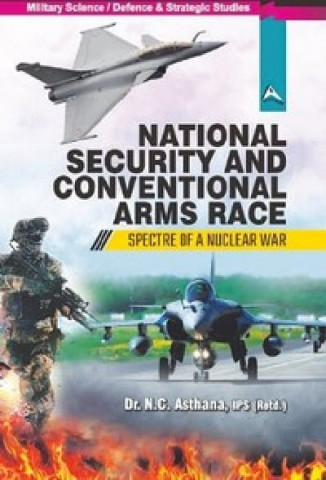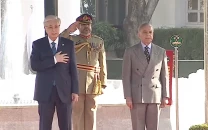India can't defeat Pakistan militarily, argues former Indian police officer in new book
Says frenzied import of conventional weapons cannot guarantee solutions to military problems posed by Pakistan, China

India has no clarity about its military and strategic objectives vis-à-vis its stated adversaries, Pakistan and China, and can defeat neither of them in a war, says NC Asthana, a former Indian police officer, in his book National Security and Conventional Arms Race: Spectre of a Nuclear War.
In a review by The Wire on December 29, Siddharth Varadarajan, the editor of the news and opinion website quotes Asthana’s book as saying: “India has no clarity about its military and strategic objectives vis-à-vis its stated adversaries, Pakistan and China, and can defeat neither of them in a war.”
The review further quotes the book as seeing “a huge mismatch between the militaristic official and media rhetoric, on the one hand, and the reality, which is that India cannot defeat either country militarily”.
“Instead of pouring vast sums of money into expensive weapons imports, India would be better served by finding solutions to the security challenges both Pakistan and China present by strengthening itself internally and pursuing non-military solutions, including diplomacy,” The Wire stated, quoting Asthana.
The author of the book also puts an emphasis on India’s ‘warmongering politics’ that has consumed the Indian public over the past six years.
“Under the delusion that India has somehow, magically become invincible and how a large number of Indians seem to be itching for a war,” The Wire quotes Asthana. “Exploiting enmity with Pakistan for electoral benefits has made Indian leaders victims of their own rhetoric where they are left with a one-dimensional policy — one which is unrealistic in view of Pakistan’s nuclear weapons.”
India’s ‘invincibility’ narrative had been fuelled and strengthened by relentless arms imports. The author of the book has put an estimate of $14b billion on it since 2014. However, the undisclosed cost of the 36 Rafale jets purchased from Dassault Aviation was not included in the estimate.
“This sum pales before the $130bn India is projected to spend on arms imports in the next decade, including on 100-plus even more expensive fighter jets to make up for the shortfall caused by the Modi government’s decision to scrap the earlier deal for 126 Rafales,” The Wire stated.
“As the fanfare over the arrival of the first Rafales showed, each of these purchases is hailed and sold to the public by the media as weapons that will flatten India’s enemies. But of course, this is far from the truth,” Varadarajan quotes Asthana.
Asthana further argued in his book that the frenzied import of conventional weapons would never guarantee a permanent solution to the military problem posed by Pakistan or China because both the countries are nuclear-weapon states and could not be decisively defeated on the battlefield.
“Given the myth of Indian invincibility, the futility of warmongering should be obvious. Yet, as the past few years have demonstrated, jingoism in India is at an all-time high,” The Wire stated, quoting Asthana's arguments.
“If they want peace, nations should avoid the pinpricks that precede cannon shots,” Asthana notes while quoting Napoleon Bonapart.
Even though Indian armed forces were bigger than Pakistan’s the limited number of axes of attack, in which the much-touted Cold Start could be employed, tends to make the whole thing quite predictable, according to Asthana.
He believes that there was no scope for any element of shock and surprise. Moreover, practically all options and counters to them have been debated and explored by both sides.
“In any case, the moment Pakistan feels that it is going to lose a conventional war under the weight of a bigger Indian military, it will feel compelled to go nuclear immediately,” The Wire reviewed. “This is not 1971. Recall what General Khalid Kidwai, head of Pakistan’s strategic command, told a visiting Italian arms control organisation delegation about the country’s red lines in 2002.”
The review recalled General Kidwai as saying that Pakistani nuclear weapons would be used “if the very existence of Pakistan as a state is at stake”.
“Nuclear weapons are aimed solely at India. In case that deterrence fails, they will be used if India attacks Pakistan and conquers a large part of its territory (space threshold); India destroys a large part either of its land or air forces (military threshold); India proceeds to the economic strangling of Pakistan (economic strangling); India pushes Pakistan into political destabilisation or creates a large-scale internal subversion in Pakistan (domestic destabilisation).” Asthana summarises Gen Kidwai’s red lines.
According to General Kidwai, “examples of the economic strangling of Pakistan included a naval blockade and the stopping of the waters of the Indus River”.
“Despite this information that is both in the public domain and confirmed by Indian intelligence assessments, prime minister threatened Pakistan with the abrogation of the Indus Waters Treaty in 2016, saying ‘blood and water cannot flow together’,” The Wire reviewed.
This dangerous notion of warmongering fitted well with India’s domestic political agenda both as a diversion from, and alibi for, poor governance and other failings, Varadarajan reviewed.



















COMMENTS
Comments are moderated and generally will be posted if they are on-topic and not abusive.
For more information, please see our Comments FAQ